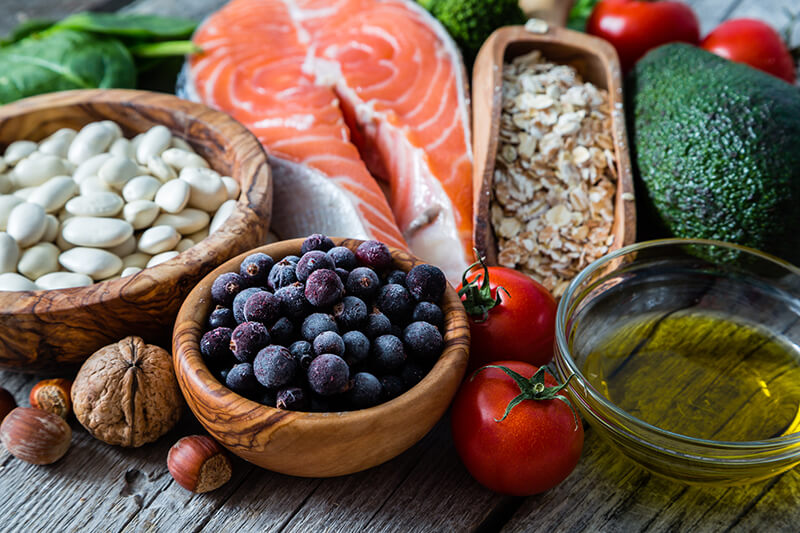
Last updated:
We spoke with pharmacist Natalie Willis and HBF dietitian Mary du Heaume and sought their advice on which nutrients will benefit you and your baby during pregnancy.
Must-haves
Even before you become pregnant, you should start thinking about your diet. “There are some nutrients which are absolutely recommended. The three most important ones are folic acid,
iron and iodine,” says Ms Willis.
Folic acid
If you’re planning on getting pregnant you should start doubling your folic acid intake. “Folic acid is
proven to help prevent neural tube defects, such as spina bifida, and you should commence at least one month prior to
conception and continue for a minimum of three months into the pregnancy,” says Ms Willis
According to Ms du Heaume, “Folate can be found in a wide variety of foods including leafy green vegetables, fruit and whole
grains, and in Australia, our bread and cereals are fortified with folic acid.” She recommends aiming for five serves
of vegetables and two serves of fruit per day and reminds us that, “Folic acid is water soluble, so to help preserve
it you should avoid boiling vegetables in water and over-cooking them. Instead, try steaming or microwaving vegetables.”
Ms Willis recommends, “a dose of 400-500mcg for most women, but if there is a risk of malabsorption or an increased risk
of neural tube defects a 5mg daily dose is recommended.” There are a number of factors that increase the risk of a neural
tube defect, they include:
- A close family history of neural tube defects
- If you’re obese
- If you have insulin-dependent diabetes (not gestational diabetes)
- If you take certain anti-epileptic medications
Iron
Available from both plant and animal sources, iron is important to help prevent anaemia, and in pregnancy, a woman usually
needs extra iron due to red blood cell development in the foetus and an increase in maternal blood volume. Ms Willis
recommends asking your doctor to perform a blood test in the early stages of your pregnancy. “That way you’ll know if
you need to take a therapeutic dose, which is about 80-100mg of elemental iron, or a maintenance dose of iron, which
is 5-20mg of elemental iron,” she says.
Ms du Heaume says the way iron is absorbed by the body differs by food group. “Animal sources of iron are more easily absorbed in the body than plant sources, and it’s a good idea
to eat your plant iron sources with vitamin C rich foods, such as oranges, tomato or capsicums,” she says. Ms du Haume also suggests discussing
your iron needs with your healthcare professional as iron supplements may be needed by some women, but too much iron
can be detrimental.
Animal sources of iron
- Red meat
- Poultry
- Fish
- Eggs, always cooked
Plant sources of iron
- Dried beans and lentils
- Green leafy vegetables
- Wholegrain bread and cereals
- Nuts
- Seeds
Drinks like tea, coffee, and soft drinks can reduce the way your body absorbs iron from plant foods. If you choose to drink
these, it’s best to have them between meals so you can get the most out of your iron-rich foods.
Iodine
It may come as a surprise, but according to Ms Willis, “Studies indicate that up to 50 percent of pregnant women in Australia
may be iodine deficient, which is worrying as iodine is essential for the development of the baby’s brain, hand-eye coordination
and hearing development.
"Some studies also suggest iodine deficiency may lead to reduced intelligence and IQ.”
“The recommended daily intake of iodine in pregnant and breastfeeding women is 250mcg which will usually
require a supplement containing at least 150mcg of iodine,” she says.
Foods rich in iodine include seafood and seaweed, nori sheets, meat and dairy products. Ms du Heaume recommends, “Women with pre-existing thyroid conditions should consult their doctor before taking iodine supplements.”
The 'maybe' supplements
Depending on current dietary intakes, Ms Willis advises that women may benefit from the following additional supplements:
Probiotics
“There’s a growing body of evidence that suggests taking a probiotic containing Lactobacillus rhamnosus GG (LGG)
during pregnancy and breastfeeding can reduce the risk of the baby developing atopic allergies, such as eczema, by as
much as 50 percent, which is particularly important in families where one or more family members suffer from eczema,
hay fever or asthma. When combined with other specific Lactobacillus and Bifidobacterium strains a probiotic may also
assist in the development of a healthy immune system and balanced intestinal microflora in the newborn. Importantly,
your pharmacist should be able to advise you on products containing the clinically trialled strains,” says Ms Willis.
Ms du Heaume advises, “It’s during the birth when mothers actually pass on bacterial diversity to their baby.”
Probiotic foods include live culture yoghurt, fermented vegetables such as sauerkraut and kimchi, kombucha tea, kefir (a
fermented milk) and miso soup made from fermented grains.
Omega 3 fatty acids
Omega 3 fatty acids are critical for foetal and infant visual and neurodevelopment. Ms Willis warns, “There’s some evidence
to suggest that low omega 3 may result in preterm labour, pre-eclampsia and lower birth weight babies.” With low omega
3 levels common among Western women, Ms du Heaume suggests consuming fish two to three times per week with oily fish,
in particular, an excellent source of omega 3.
“Women should try to limit some fish, as they are known to contain higher levels of mercury. An occasional
meal of the higher mercury fish should not cause concern as it is the potential build-up of mercury in the mother’s blood
from regular consumption that increases risk,” says Ms du Haume. Here are the recommended serving sizes according to the Food Standards Australia New Zealand guidelines1:
- Limiting to one serve (150g) per fortnight: billfish (swordfish, broadbill and marlin) and shark (flake), with no other
fish eaten in that fortnight; or
- Limiting to one serve (150g) per week: orange roughy (deep sea perch) or catfish, with no other fish eaten that week;
or
- Eating two to three serves per week of any other fish or seafood (for example, salmon or tuna).

Vitamin D3
“Almost one-third of Australians have inadequate vitamin D levels, while studies of Australian newborns
have shown approximately 50 percent have insufficient vitamin D levels,” says Ms Willis. “Vitamin D is important
for a baby’s developing skeleton, as well as the development of a healthy immune system. Very little vitamin D is found
in breast milk so if a baby is born with low vitamin D levels they will remain low for some time,” she says.
Ms Willis recommends
getting a blood test to determine your vitamin D level, which will determine the level of supplementation required in
pregnancy.
While most of us get our vitamin D from the sun, Ms du Heaume recommends eggs and fatty fish such as mackerel, herring and
salmon as good sources of vitamin D, but warns, “Our food choices only provide up to 10 percent of our vitamin D requirements
and the rest comes from the sun.”
Pyridoxine (Vitamin B6)
Ms Willis advises, “A dose of 12.5mg in the morning and at lunchtime and 25mg at night might be helpful to reduce symptoms
of morning sickness.” According to Ms du Heaume, “B6 can be found in a wide range of both plant and animal foods including
legumes, nuts, potatoes, yeast spreads, vegetables, pork and fish.”
Calcium
According to Ms Willis, “The developing baby will take calcium from the mother to use in bone development, so sufficient
maternal levels are necessary so as not to affect bone density in the mother.” Ms du Heaume explains, “The human body
is an amazing thing. An expecting mother's body adapts and increases the amount of calcium it absorbs during the third
trimester, in response to their baby's increased demand for calcium for bone development and to protect the mother's
calcium stores in her bones.”
She advises, “Dairy foods, calcium-fortified soy milk, and green leafy vegetables are all good sources of calcium.”
Ms Willis advises, “Where a pregnant woman has a poor diet, or has severe morning sickness and is unable to eat properly,
a pregnancy-safe multivitamin may be recommended.”
She reminds readers, “Always consult your healthcare professional before you begin taking any supplements.”
What about the men?
It’s not just women who need to think about nutrition. A dad-to-be should also consume a healthy diet rich in fruits and vegetables, lean meats (particularly fish) and healthy fats. “Nutrients for men centre around antioxidants, which help the production of healthy sperm,” says Ms Willis.
There are other steps men should consider to improve overall welling.
“Reduce cellular stressors including smoking, alcohol, poor diet, excessive caffeine and physical, emotional and environmental stress,” says Ms Willis.
Starting a family?
Make sure you've got them covered. Check out how you can protect your loved ones on a budget with HBF.
Sources:
1 Food Standards Australia New Zealand - Mercury in fish (2020)